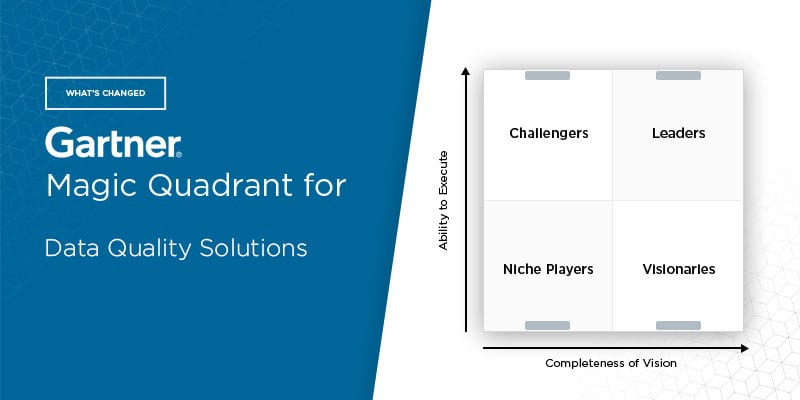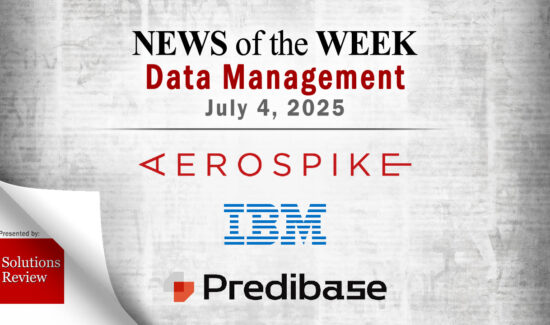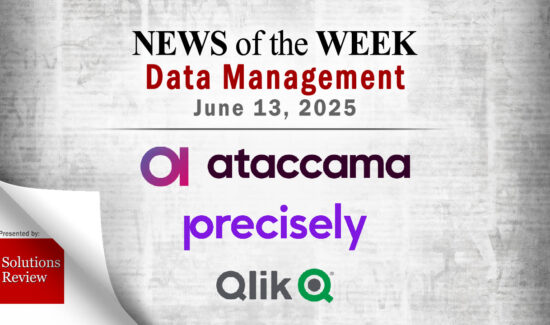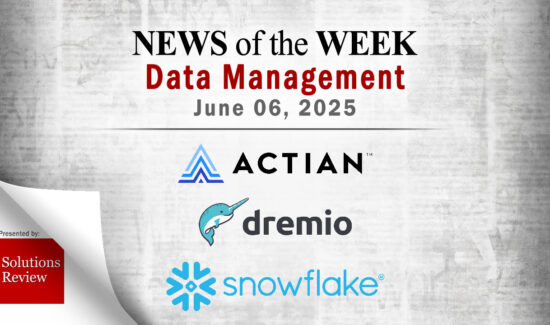What’s Changed: 2020 Gartner Magic Quadrant for Data Quality Solutions


The editors at Solutions Review highlight what’s changed since the last iteration of Gartner’s Magic Quadrant for Data Quality Solutions and provide analysis of the new report.
Analyst house Gartner, Inc. recently released the 2020 version of its Magic Quadrant for Data Quality Solutions. Digital transformation is the biggest driver of dedicated data quality solution adoption among large organizations. According to Gartner, “This stems from a need to overcome the challenges from complex and distributed data landscapes, and new and urgent business requirements.” As a result, the researcher argues, data and analytics leaders are scrambling to provide trusted data so business stakeholders can make faster and more confident decisions.
While data quality initiatives were traditionally compliance-minded in order to reduce operational risk and cost, these products are increasingly being used in analytic settings to increase the likelihood of impactful decision-making. Products in this software category are also beginning to get the ‘augmented’ experience similar to data platforms in horizontal markets. This means that many of the solution providers are integrating AI and machine learning capabilities that effectively ‘augment’ the data quality process by automating intensive, manual tasks to help users save time and generate more accurate results.
You may notice that Gartner re-named this report in 2020 by replacing the term ‘Data Quality Tools’ with ‘Data Quality Solutions.’ This is due to the researcher’s assessment of market demand, and to the evolution of critical technologies and capabilities associated with data quality software. Gartner adds: “Effective data quality practices require more than a tool. A complete data quality solution includes built-in workflow, knowledge bases, collaboration, interactive analytics, and automation to support various uses cases across different industries and disciplines.”
It is expected that data quality vendors will continue to broaden the features included in their products in the near future. Gartner expects to see continued additions of data integration, metadata management, and Master Data Management functionality as a result. The report concludes: “Evaluating and selecting data quality solutions is much less of a specialized IT task than it was formerly.”
In this Magic Quadrant, Gartner evaluates the strengths and weaknesses of 16 providers that it considers most significant in the marketplace, and provides readers with a graph (the Magic Quadrant) plotting the vendors based on their ability to execute and their completeness of vision. The graph is divided into four quadrants: niche players, challengers, visionaries, and leaders. At Solutions Review, we read the report, available here, and pulled out the key takeaways.
Gartner adjusts its evaluation and inclusion criteria for Magic Quadrants as software markets evolve. As a result, Infogix, Melissa Data, Precisely (formerly included as Syncsort), and Syniti (formerly included as BackOffice Associates) have been added to the 2020 report. Pitney Bowes was removed due to its acquisition by Syncsort in December 2019.
The Leaders quadrant remains largely unchanged, featuring three mega-vendors in Informatica, IBM, and SAP as the class of this marketplace. Informatica once again owns the top spot, offering four qualifying data quality solutions and top-notch understanding of the space. Its data profiling and multidomain support features are ranked the best-in-class, and reference users report ease of use for both. 42 percent of Magic Quadrant survey respondents shortlisted Informatica in their evaluations.
IBM’s Watson Knowledge Catalog was released in June and features some of the most forward-thinking AI and machine learning technologies of any product included in this report. Gartner reference customers also rated IBM data quality tools as being a great value relative to cost. SAP touts the highest market share (20 percent) of any data quality software vendor, and the provider is currently undertaking a cross-tool integration that would bring broader connectivity between its portfolio of data management tools. However, solution-seeking organizations report issues with IBM’s pricing and licensing structure.
SAS and Talend continue to battle it out in the middle of the Leaders column for the second-straight year. SAS holds the slight edge on Gartner’s vertical axis as a result of aligning its sales and marketing strategies. With a 6 percent share of the market, the top-ranked product technical support of any data quality vendor, and the alignment of its data quality tools into SAS Viya, SAS has its arrow pointing straight up going into 2021. Talend offers commercial (Talend Data Management) and open-source (Talend Open Studio for Data Quality, Talend Data Preparation Free Desktop) data quality software. The company also scored above average for overall product capabilities and ease of use.
As a result of its acquisition of the Pitney Bowes software and data business in late 2019, Precisely (formerly Syncsort) makes its debut in this Magic Quadrant. Owning the third-largest market share of any vendor in this report behind SAP and Informatica, Precisely immediately becomes major player in this space. According to the company, its updated product line will span “the breadth of the data integrity spectrum” by offering data integration, data quality and location intelligence tools. Precisely’s line of data quality solutions is mature.
Ataccama and Information Builders swapped roles at the top of the Visionaries bracket in this year’s analysis. Ataccama now finds itself only stone’s throw away from attaining market leader status for 2021. The vendor has focused on adding emerging functionality to its core data quality platform that enable automated data discovery and suggestions. Information Builders targets its focus to the financial services, healthcare, and the public sector. The vendor features excellent integration with its MDM and data integration solutions, and earned above average scores for off-prem deployments via SaaS or cloud.
While MIOsoft’s placement remains static, the vendor is one of the highest-rated in terms of customer satisfaction in the space. Gartner reference customers cite strong product technical support and professional services as well. Short deployment times, ease of use, and simple upgrades and migrations between versions also make it a standout. Infogix makes its debut in this report just below MIOsoft on the grid. Its platform features excellent metadata management functionality. It is also a top-performer in customer satisfaction, reporting an incredible 98 percent customer retention rate. Infogix reference users also report ease of use, installation, upgrades, and integration as major strengths.
Oracle headlines the Challengers column after being positioned as a Leader in 2019. Gartner notes that its pricing model and complex licensing are holding greater adoption back. However, its Enterprise Data Quality product is on a growth pattern via cloud-based deployments and offers a complete line of data quality critical capabilities. Experian lost a bit of ground on Gartner’s vertical axis for ability to execute, but enjoys the fourth-largest adoption rate of any data quality vendor. Experian has a focus in customer data enrichment, so it’s no surprise that 80 percent of its customers are using it for that use case. Gartner reference customers report ease of use and implementation as major strengths of Experian’s tools.
Innovative Systems made the leap to the Challengers space for 2020 off the back of “solid and stable” core data quality features which are driven by a crowdsourced AI-based approach. Reference customers score it above average for parsing, standardization, cleansing, matching, linking, merging, business-driven workflow, and real-time processing. Customers also rave about the vendor’s customer service and support.
Redpoint and Syniti (formerly BackOffice Associates) remain Niche Players for 2020. Redpoint offers ease of installation, upgrade and use, and has a top-rated customer satisfaction score from reference users. Syniti touts an expansive partnership program with SAP and offers good support for all data domains. Melissa Data also makes its first appearance as a Niche Player. It offers data validation services for standardizing various data objects, and received high scores for pricing and contract flexibility. Reference customers also report on Melissa’s technical support and professional services.




















